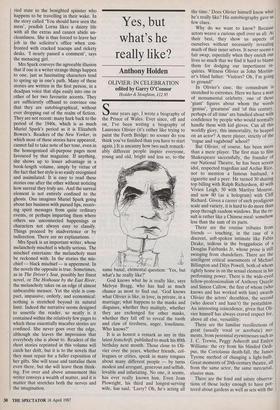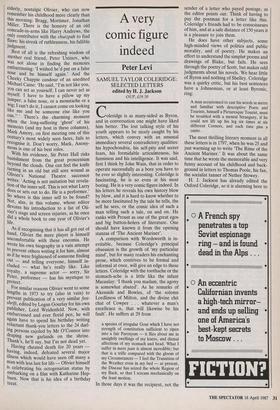Yes, but what's he really like?
Anthony Holden
OLIVIER: IN CELEBRATION edited by Garry O'Connor
Hodder & Stoughton, £12.95
Some years ago, I wrote a biography of the Prince of Wales. Ever since, off and on, I've been writing a biography of Laurence Olivier (it's rather like trying to paint the Forth Bridge: no sooner do you think you've finished than you have to start again.) It is uncanny how two such remark- ably different people inspire everyone, young and old, bright and less so, to4the same banal, elemental question: 'Yes, but what's he really like?'
God knows what he is really like, says Melvyn Bragg, who has had as much chance as most to find out. 'God knows what Olivier is like, in love, in private, in a marriage; what happens to the masks and disguises, whether they multiply, whether they are exchanged for other masks, whether they fall off to reveal the tooth and claw of tiredness, anger, loneliness. Who knows?'
It is as honest a remark as any in this latest festschrift, published to mark his 80th birthday next month. Those close to Oli- vier over the years, whether friends, col- leagues or critics, speak in many tongues about many different people — by turns modest and arrogant, generous and selfish, lovable and infuriating. No one, it seems, has ever really known him. Even Joan Plowright, his third and longest-serving wife, has said, 'Larry? Oh, he's acting all the time.' Does Olivier himself know what he's really like? His autobiography gave us few clues.
Why do we want to know? Because actors weave a curious spell over us all. At their best, they show us aspects of ourselves without necessarily revealing much of their inner selves. It never seems a fair swap, especially when they enrich our lives so much that we find it hard to blame them for dodging our impertinent in- quiries. Witness Olivier as John Mortim- er's blind father: 'Visitors? Oh, I'm going to ground!' In Olivier's case, the conundrum is stretched to extremes. Here we have a man of monumental celebrity, one of those `giant' figures about whom the words `genius', 'greatness' and 'of this century, perhaps of all time' are bandied about with confidence by people who would normally handle them with kid gloves. Can all this worldly glory, this immortality, be heaped on an actor? A mere player, strictly of the `rogue and vagabond' school?
But Olivier, of course, has been more than a mere player. The first man to film Shakespeare successfully, the founder of our National Theatre, he has been screen idol, respected tragedian and Archie Rice, not to mention a famous husband, a cigarette and a peer. He turned 30 sharing top billing with Ralph Richardson, 40 with Vivien Leigh, 50 with Marilyn Monroe, and now 80 (as a hologram) with Cliff Richard. Given a career of such prodigious scale and variety, it is hard to do more than peep through random windows. But the re- sult is rather like a Chinese meal: somehow less than the sum of its parts.
There are the routine tributes from friends — touching, in the case of a discreet, soft-spoken intimate like Fabia Drake, tedious in the braggadocio of a Douglas Fairbanks Jr, whose prose is still swinging from chandeliers. There are the intelligent critical assessments of Michael Billington and Dilys Powell, both of whom rightly home in on the sexual element in his performing power. There is the wide-eyed fellow-professionalism of Anthony Quayle and Simon Callow, the first of whom (who• knows and has worked with him) awards Olivier the actors' decathlon, the second (who doesn't and hasn't) the pentathlon. An interesting coincidence, given that Oli- vier himself has always craved respect for, above all else, versatility. There are the familiar recollections of great (usually vocal or acrobatic) mo- ments, from perennial eyewitnesses such as J. C. Trewin, Peggy Ashcroft and Emlyn Williams: the cry from his blinded Oedi- pus, the Coriolanus death-fall, the James Tyrone method of changing a light-bulb. Great moments of 20th-century theatre, all from the same actor, the same mercurial, elusive man.
There are the fond and astute observa- tions of those lucky enough to have pot- tered about gardens as well as sets with the elderly, nostalgic Olivier, who can now remember his childhood more clearly than this morning: Bragg, Mortimer, Jonathan Miller. There is the honesty of an old comrade-in-arms like Harry Andrews, the only contributor with the chutzpah to find flaws: his streak of ruthlessness, his fallible judgment.
Best of all is the refreshing wisdom of another real friend, Peter Ustinov, who was not alone in finding the memoirs embarrassing: 'I wished he'd put on a false nose and be himself again.' And the Cheeky Chappie candour of an unedited Michael Caine: 'He said, "I'm not like you, you can act as yourself, I can never act as myself. I have to have a pillow up my jumper, a false nose, or a moustache or a wig; I can't do it, I cannot come on looking like me and be someone else like you can." There's the charming moment when the long-suffering 'ghost' of his memoirs (and my host in these columns), Mark Amory, on first meeting one of this century's most widely seen faces, fails to recognise it. Don't worry, Mark, Anony- mous is one of his best roles. With his evidence, Sir Peter Hall risks banishment from the great proscenium beyond the clouds. One can feel the knife turning in an old but still sore wound as Olivier's National Theatre successor writes: 'Acting is not imitation but revela- tion of the inner self. This is not what Larry does or sets out to do. He is a performer.' So where is this inner self to be found? Not, alas, in this volume, whose editor devotes his introduction to a list of Oli- vier's stage and screen injuries, as he once did a whole book to one year of Olivier's life.
As if recognising that it has all got out of hand, Olivier the mere player is himself uncomfortable with these encomia. He wrote his own biography in a vain attempt to prevent others writing it for him, almost as if he were frightened of someone finding out — and telling everyone, himself in- cluded — what he's really like. Like royalty, a supreme actor — sorry, Sir Peter, performer — has his mystique to protect.
For similar reasons Olivier went to some lengths in 1973 to try (also in vain) to prevent publication of a very similar fest- shrift, edited by Logan Gourlay for his own publisher, Lord Weidenfeld. Now, with embarrassed and ever florid pen, he will again have to spend his birthday writing reluctant thank-you letters to the 24 darl- ing persons cajoled by Mr O'Connor into draping new garlands on the shrine. Thank's, he'll say, but I'm not dead yet. Having cheated death for 20 years having, indeed, defeated several major illness which would have seen off many a man with less lust for life — Olivier himself is celebrating his octogenarian status by embarking on a film with Katharine Hep- burn. Now that is his idea of a birthday treat.



















































 Previous page
Previous page